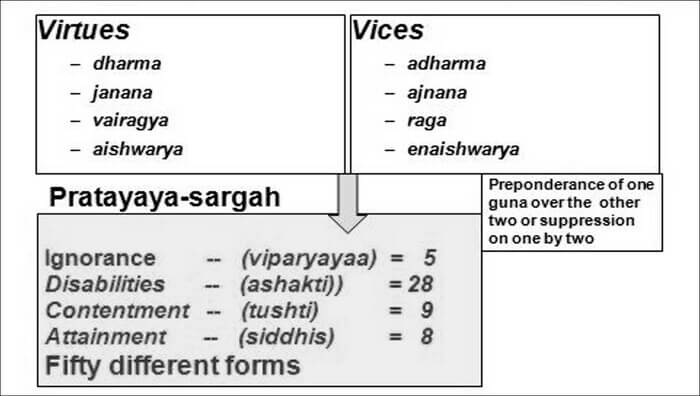Author: Randeep Singh / go to all Samkhya Karikas

Samkhya Karika 47 text:
Pancha viparyaya bhedaah bhavantya- ashakti cha karana vaikalyaat |
Ashtaavimshati bhedaah tustihr navadha ashtadhaa siddhih ||
Pancha – five
Viparyaya bhedaah – divisions in viparyaya
Ashakti – inability, incapacity
Ca – and
Karana vaikalyaat – as per the deficiencies of the senses
Ashtaavimshati – has twenty eight divisions
Tushtihr – contentment, satisfaction
Navadhah – nine fold
Ashtadhaa – eight fold
Siddhih – powers, achievments, perfections
Samkhya karika 47 very cryptically gives out the number of divisions of each of the four dimensions of Buddhi (intellect) as explained in the previous karika. It enumerates that there are five forms of Viparyaya (mis-perception) wrong perception or ignorance. The number of disabilities, or Ashakti are twenty eight in number.
Nine forms forms of satisfactions (Tushtih) and eight types of Siddhih (attainments, powers) exist. Total divisions as mentioned come to be fifty in number. The Buddhi remains in any of these forms because of the constant interplay of three types of gunas.
This karika is not easy to understand in present times. Similar to Yoga Sutras, Samkhya karikas are also written with a larger meaning encased into lesser word which project abbreviated concepts. The era Samkhya philosophy belongs to was the era when Sutras and karikas were written bound by certain rules and had a grammar of their own.
Today’s commentators won’t be able to do justice to the proper interpretation and intention of Samkhya karika 47 in their commentaries though some of them have tried to infer the details of the divisions of each of the four dimensions of human intellect (Buddhi) as enumerated in its text.
This Sankhya karika gives birth to various theories and explanations as it appears to be non self explanatory. Isvar Krsna does mention that this philosophy (divisions of dimensions in which Buddhi can exist) is based on Sasthi Tantra, the sixty topics which are not explained by him. So, it can be eroneous to assume what these divisions stand for.
The five Viparyaya (mis-perception) as mentioned can be misconception, erroneous knoweldge, ignorance of right knowledge or wrong knowledge. This karika mentions that their are twenty eight types of deficiencies, or inabilities (Ashakti) present in eleven sense organs. It is believed that from these twenty one is present in each of the eleven senses and the rest are present in Buddhi.
Further Samkhya karika 47 mentions nine types of contentment (Tushtih) and eight types of powers (Siddhih). In its content this karika seems to be an extenion of the previous karika and it just enumerates upon the number of dividions each dimension of Buddhi can have.
It also makes us aware of different natures of various senses present within an individual. It is advised that one must focus on practicing philosophy as a whole and not attempt to provide personal interpretations to its parts.
